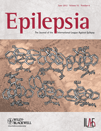Interictal psychotic episodes in epilepsy: Duration and associated clinical factors
Summary
Purpose: There have been few reports showing the distribution of the duration of interictal psychosis (IIP) episodes and their association with clinical characteristics. To clarify the nature of IIP, we studied the duration of IIP episodes and their related factors.
Methods: One hundred fifty-five patients with epilepsy exhibited 320 IIP episodes during our follow-up period (mean 16.9 years). The duration of all the episodes and the longest episode in each patient during the follow-up periods were studied. Characteristics of the patients (e.g., epilepsy type, age of onset, and family history of psychosis) and episode-specific factors (e.g., age of the episode, seizure frequency, administrations of antiepileptic drugs [AEDs] and antipsychotic drugs [APDs]) were analyzed in association with the duration of the episodes.
Key Findings: Mean duration of the 320 IIP episodes was 82.7 weeks and that of the longest IIP episodes was 150.1 weeks. During the follow-up period, 17 patients (11.0%) showed all episodes remitting within a month and 54 (34.8%) showed all episodes lasting for 6 months or longer. The IIP episodes that occurred at a younger age were often prolonged. Patients with a family history of psychosis or with early onset of psychosis tended to have more prolonged IIP episodes. Among the episodes treated with APDs, early administration of APDs was significantly associated with shorter IIP duration.
Significance: The distribution of the duration of IIP episodes indicated the broad spectrum and heterogeneity of the IIP phenomena. The individual vulnerability to psychosis may be associated with prolonged episodes. Administration of APDs soon after onset of the episodes appeared to be effective in controlling them. These findings support empirical treatment principles for IIP to administer APDs at an early stage of its development.




